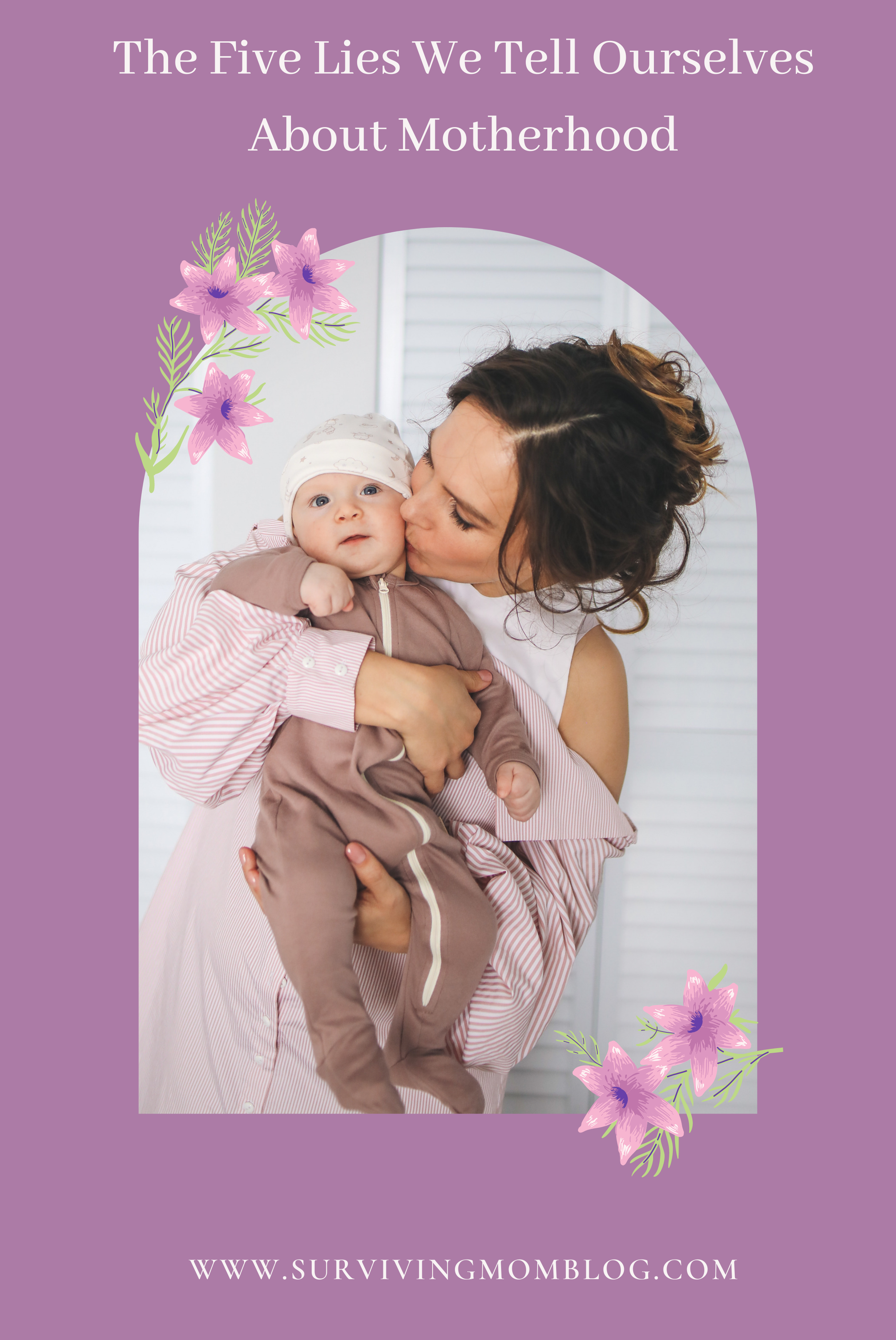
There are many false ideas and lies we tell ourselves about motherhood. Before I became a mother, I had this dream of what motherhood would entail. I imagined a well-behaved, perfectly mannered child. I had a husband who I never argued with. In turn, I was put-together, organized, cool as a cucumber under pressure, and never raised my voice. Basically, I thought we were going to become the Brady Bunch.
There are many harsh realities I faced as a mom. I had many idealized notions blow up in my face, and I had many misguided ideas of what I needed to be as a mother. I’m sharing the lies we often tell ourselves that prevent us from truly embracing motherhood.
It is our duty to be the perfect role model for our kids
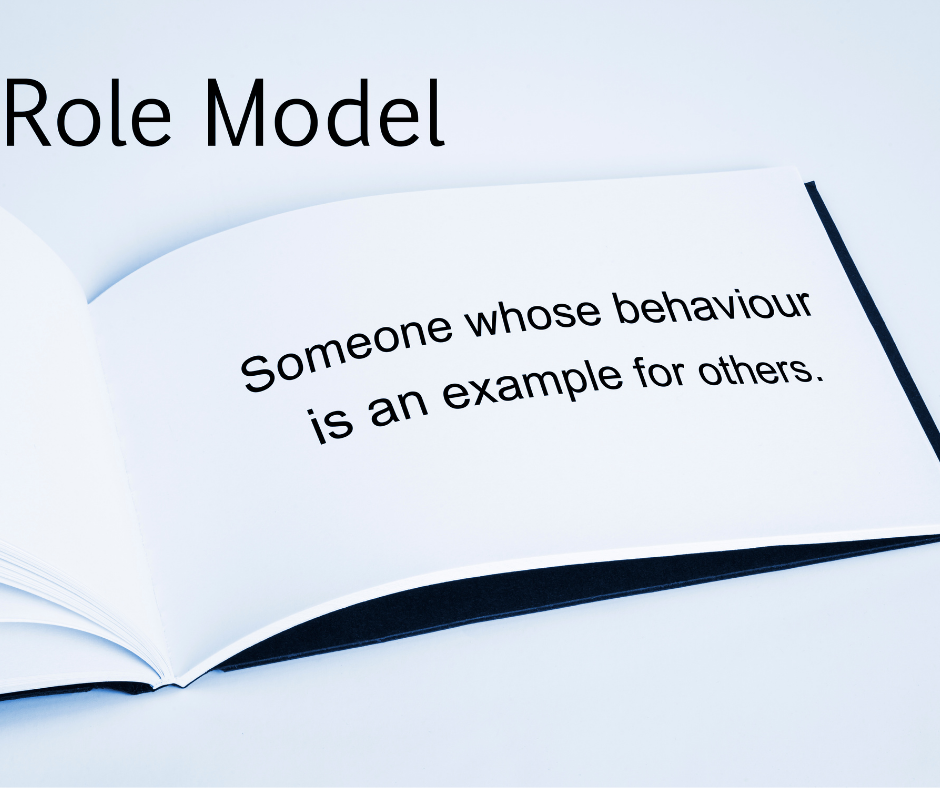
Raise your hand if you feel guilty when you don’t say or do the right thing. Okay, now ALL of us (myself especially) need to give ourselves a good whack on the head. It is a lie to tell ourselves that being a mother means always getting it right. News flash- none of us are perfect. To expect that we are always going to set the right example for our kids is unrealistic at best. Truthfully, it is the reason why so many of us are wracked with guilt. We feel we are failing our kids when we make mistakes.
There is not a day that goes by that I don’t have regrets. There are instances where I feel I raised my voice when I should have been patient, or I was too lenient and should have been firmer. Some days I wasn’t fully present when asked a question, or I was too overly involved and didn’t give Brielle enough time to play independently and foster self-sufficiency. There are instances where I’ve lost my temper when I could have modeled emotional regulation, or Brielle saw me get frustrated instead of persevering.
I am emotional, I am anxious, I am frazzled, and I am completely and utterly imperfect.
However, isn’t that what being a good role model is truly about? Showing your kids that you are human and that all we can do is learn from our mistakes and keep striving to grow? Isn’t being a good mother showing your kids that imperfections are what make us lovable?
When I make mistakes, I apologize to my daughter. I show my daughter that it is important to take responsibility for our actions, but that we should not demand perfection from ourselves. Trying is what matters. In the instances where I start to fall back into my perfectionist tendencies, I tell Brielle that I need to remember that I’m not perfect. Being honest with our children about our mistakes allows them to feel comfortable with their own imperfections.
We can beat ourselves up for our mistakes, or we can be model self-compassion and self-love. That is how we are good role models for our kids. The truth is, being imperfect role models is what makes us good role models.
We are doomed to be bad parents if our parents weren’t good to us is another lie we tell ourselves about motherhood
I am the poster child for having a dysfunctional family. I had a mother who did terrible, unspeakable things to me. Her mother did terrible, unspeakable things to her. However, it is a lie to tell ourselves that we cannot be a good mother because of our parents.
It Is true that there is a cycle of abuse, and that those who abuse were often abused themselves. That said, you are not doomed to repeat the sins of your parents. If you are worried that you are going to be like your parents, that means you recognize that what was done to you wasn’t okay. If you have that awareness, you can implement change.
As I mentioned, my mother was abused and abused me. However, she refused to admit that her mother was abusive, and also refused to acknowledge that she was abusive. It is that refusal that enables the cycle to continue. How can you stop doing something wrong if you aren’t able to see that it is a problem?
If you know that terrible things were done to you, then you have the power to do better with your own children. If you are unwilling to turn a blind eye to what happened to you, then you are able to do the same thing with your children.
Awareness brings change. It brings understanding, acknowledgment, and healing. Use what happened to you as a reminder of what to never do with your kids.
Having terrible things done to you does not mean you will do them as well. It means you have the opportunity to do things better. I did it, and you can do it too.
You must always stay strong for your children
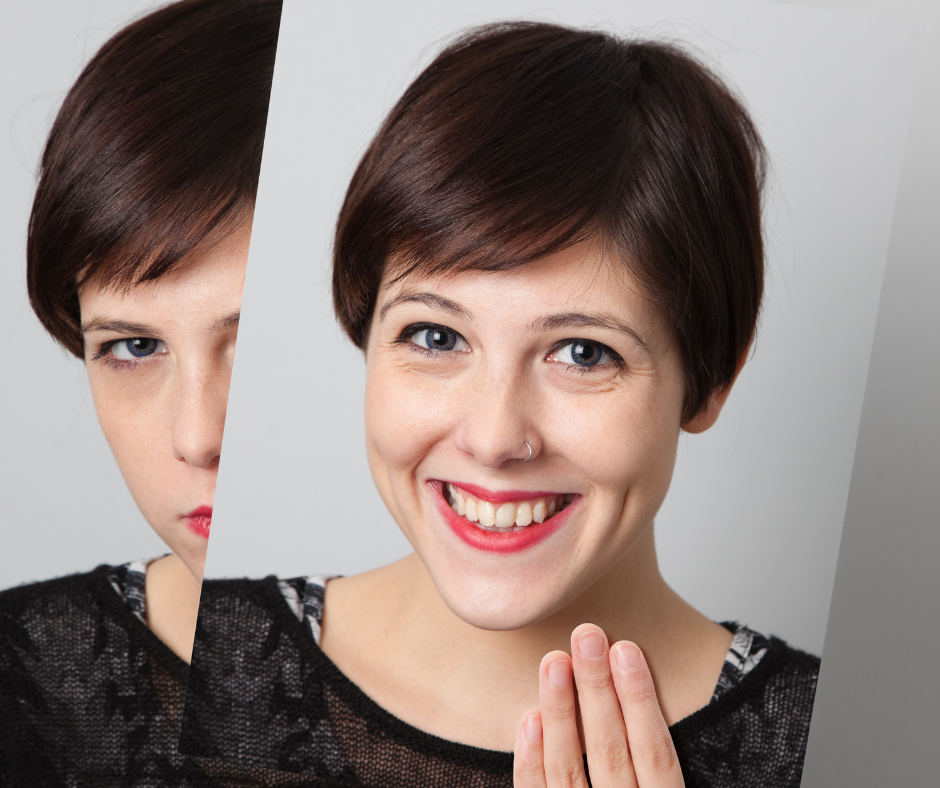
This lie we tell ourselves about motherhood is an especially hot button for me. I know there are many parents out there who will go into another room when they are sad, so their kids don’t see them cry. I know there are many parents who go out of their way to stay even-keeled at all times.
That’s not me. I don’t think it should be you either.
Here’s why- in our efforts to protect our kids from seeing us sad, mad, anxious, hurt, etc., we are inadvertently telling our kids that those emotions should be hidden. Negative emotions are inevitable, and hiding it from them sends the message that those feelings aren’t okay. It makes our children shy away from feelings, rather than making space for them. It tells our kids, in big, bold letter, that it is not okay to not be okay.
I am a firm believer that it is absolutely, positively, without a shadow of a doubt, okay to not be okay.
In fact, I encourage it. If we run away from our emotions, and we bury them, we will never learn to cope. That is why people land up turning to drugs, alcohol, and other unhealthy choices. If we don’t learn healthy coping mechanisms, we will turn to unhealthy ones. It’s like buying a car without ever learning to drive. How do you deal with life’s obstacles if you are never given the tools to handle them?
If your kids are sad, upset, frustrated, overwhelmed, please don’t tell them to be strong. Being strong IS having emotions. True strength is allowing yourself to feel without judgment, while figuring out how to deal with those feelings. Strength is not sucking it up and acting like you’re fine when you’re not. Being a robot isn’t being strong; it’s burying your feelings. Encourage your children to discuss their feelings with you.
Show them empathy and understanding.
Hold space for their feelings and learn to feel comfortable with them not being okay. Accept that your children are not always going to feel happy. It’s part of life. That teaches them to become comfortable with their emotions instead of running from them. Let your kids see that you feel. Show them that moms get sad, mad, and worried too.
Be open about your feelings, but don’t discuss your adult problems with them. Rather, show them that you feel different emotions, and that it is okay for them to have them too. Showing your emotions also doesn’t mean you shouldn’t take time to yourself to process your feelings. You can absolutely tell your kids you feel overwhelmed and then go into another room to cry, scream into a pillow, etc. There’s a difference between that and pretending that you don’t have any negative feelings at all.
Above all, model healthy strategies to deal with your feelings, so they in turn can use those strategies too.
Whether it is writing in a journal, doing breathing exercises, reading a book, listening to music, or just having a safe person to talk to, show your kids how you handle not being okay. It is important to teach them that sometimes, despite all the strategies implemented, there is nothing that will make them feel better but time and acceptance. There are situations where problem solving can make you feel better, and others where there is no solution. Sometimes we just need a hug, support, and to know that people care.
There might be times when you or your child has difficulty regulating your emotions. If you explode into a fit of anger, or your child has a meltdown, acknowledge that there are healthier ways of handling our emotions. Discuss what should be done differently next time, and remind your child (and yourself) that learning better ways to handle emotions doesn’t mean we aren’t allowed to feel emotions at all.
Showing your kids that you are human gives them permission to feel whatever they need to feel. It is a wonderful gift to show your children that ALL emotions are okay, while teaching them healthy ways to manage their emotions.
To be a parent, you are not able to have any issues of your own
Ha! Ha! If that was the case, I think many of us would still be childless (myself included).
If you are in a bad place in your life and aren’t emotionally or psychologically in a position to properly provide and care for a child, that is one thing. However, to think you need to have yourself and your life completely figured out in order to be a good mom is horse rubbish. It is merely another lie we tell about motherhood.
We are all works in progress. Just as there is no perfect mom, there is no mom that has everything figured out. We all have problems, we all have struggles, and we all have baggage.
We can accept our issues and also strive to work on ourselves.
It is necessary to be honest with ourselves about our issues, while holding compassion for our struggles. Continuing along our healing journeys is what makes us good parents.
Truthfully, being a parent allowed me to grow and heal more than anything else. I want to do better and be better for my child, but I also know there is a fine line between growing and expecting to have everything figured out. I will never have all my issues figured out. With that said, I learn new things about myself all the time. That allows me to work on new areas and see areas where I’ve made progress.
Showing our kids that we don’t have all the answers is okay. Showing your kids that you are flawed is okay. We can have baggage and still love our kids with all of our hearts. Being aware of our issues and trying our best is what makes us good parents.
The Amount of time you spend with them will determine whether Your children will feel loved
Nope. Not true. Quality is so much more important than quantity.
Being intentional with your time is what matters the most. If you are around but are preoccupied, that doesn’t give your kids a warm and gooey feeling inside. They want to feel like they matter.
Life doesn’t allow us to always be fully present. There are endless responsibilities, demands, and other things that require your attention as well. It’s okay to not always be available to your kids. Believing otherwise is a lie we tell about motherhood.
Instead, set aside a realistic amount of time to focus your attention on your child.
Don’t sneak peaks at your phone. Don’t run a to-do list in your head. Be completely present.
We institute “fun time” in our house. That means that during that period, Brielle gets to pick whatever she wants to play with me, and I put all electronic devices away. She gets my undivided attention, and she knows that is something she can count on daily. I never take fun time away as a punishment. No matter how hectic our day is, she knows I will always set aside that quality time to spend with her.
Kids, like adults, want to feel like they are the priority. Whether you are a Stay-at-Home-Mom or a working mom, you can set aside time each day to be completely devoted to them. You can have limited time, but still make your child feel loved and valued.
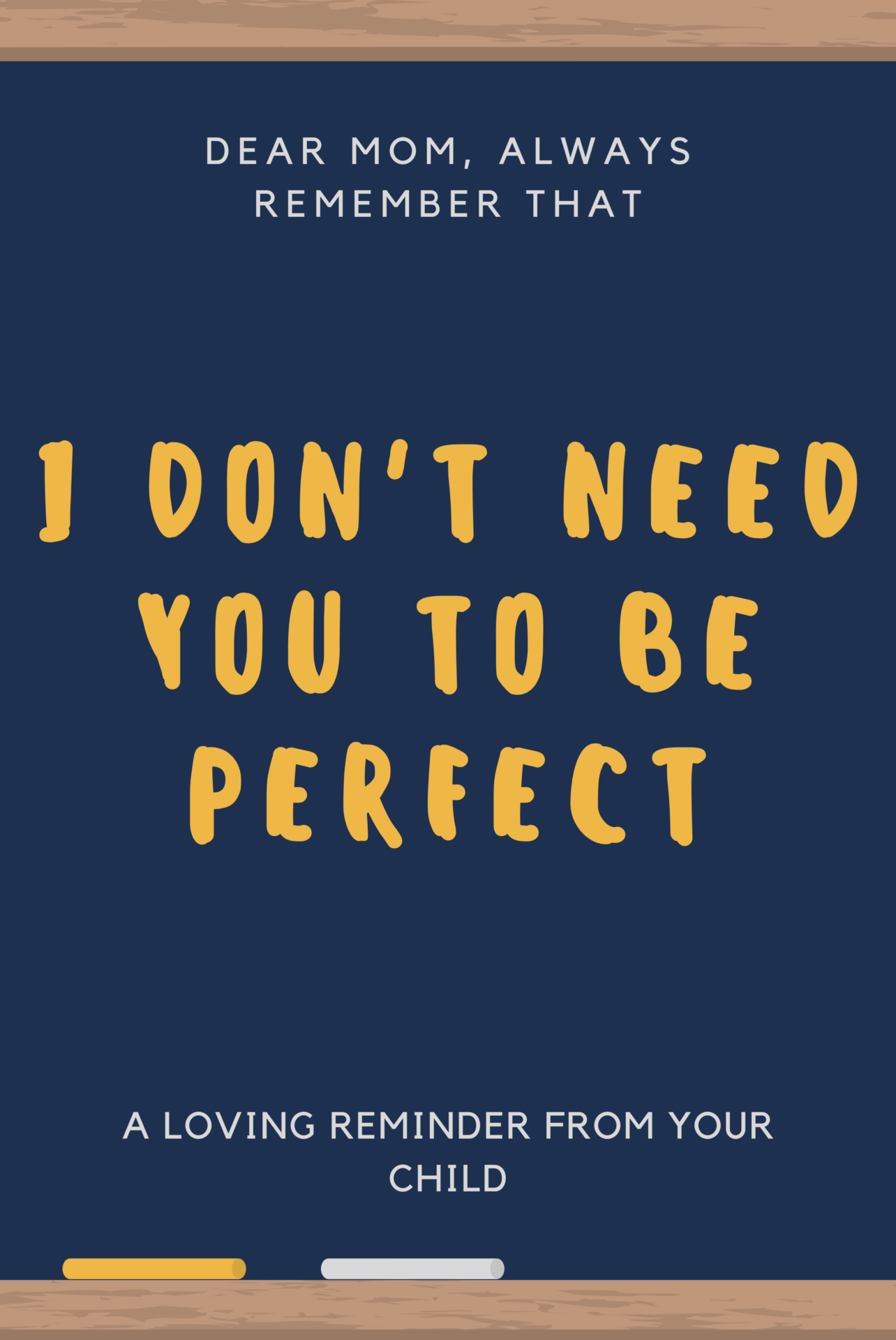
Don’t buy into the lies we tell ourselves about motherhood. Your kids don’t need a perfect parent. They need a mother who is real. A mother who no matter the number of imperfections and flaws, tries and keeps on trying. They need someone who will guide them and support them. Our children need a mom who is always in their corner, cheering them on. Loving our children is what our children need most. That is the biggest truth about motherhood, and it is one that we should always remember.
Disclaimer
This post may contain affiliate links. If you purchase a product via my link I may receive a small commission at no additional cost to you. Please visit our disclaimers here
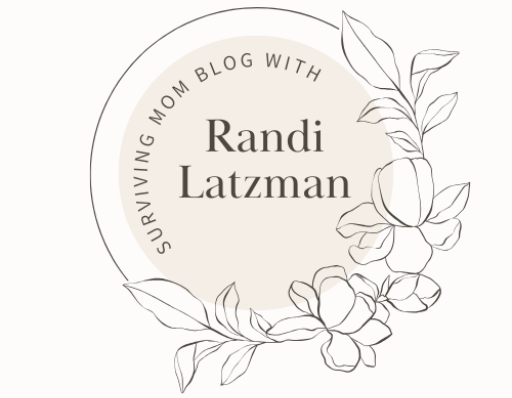
Naomi Lanr says:
This is a great message, especially for single parents. I was a single mom for four years and it was the hardest time in my life. You feel like a failure whenever you’re having a tough day with your child. I was a hot mess sometimes and now my child is a high functioning, caring, empathetic adult, so there’s your proof that you don’t always have to be perfect.
Randi says:
Hi, Naomi! Thank you very much. I give you so much credit for raising a child on your own for four years. Kuddos to you for raising a well-adjusted, caring, empathetic adult!
Laura says:
Well done and I’m very proud of you and your determination to help your family and hopefully others❤️❤️
Randi says:
Thank you so much! <3
Jenni says:
Yes to all of this!!!
Randi says:
Hi, Jenni! I’m so glad this resonated with you <3